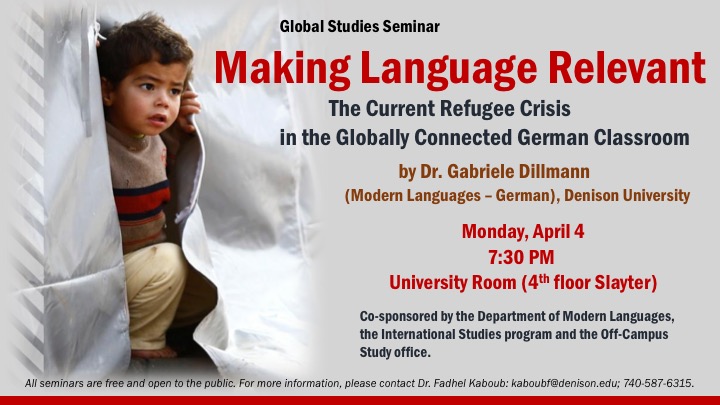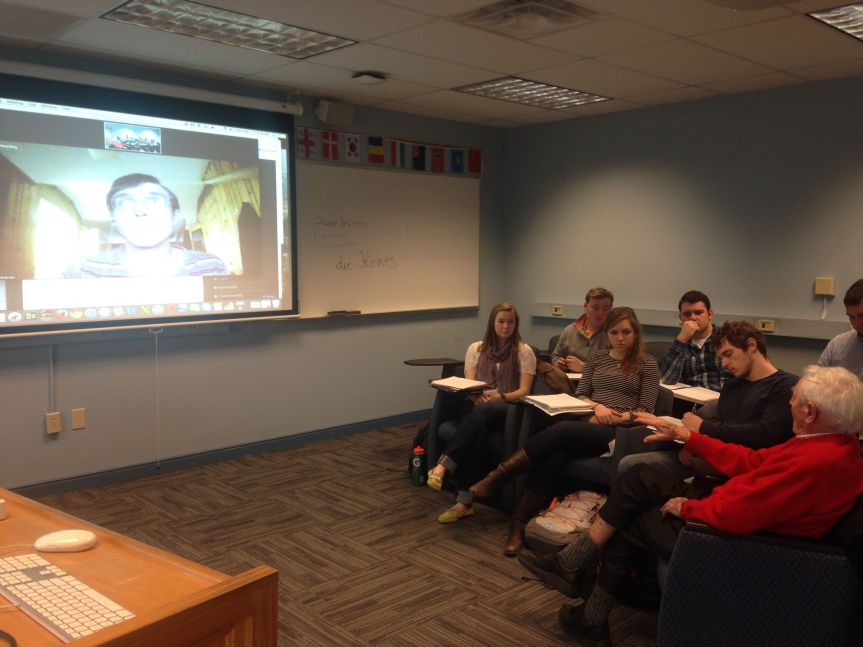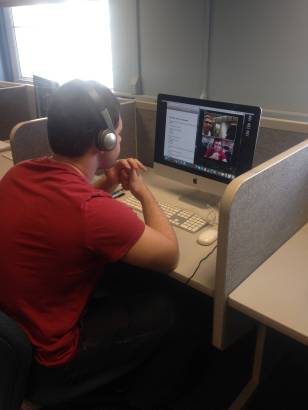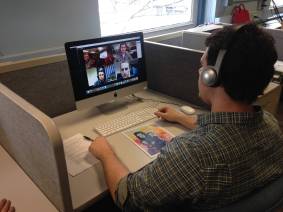Collection of Globally Connected Courses Materials

German 305 Migration from and to Germany Syllabus
Globally Connected German Courses Project
Test: Synchronous Connection AUBG and Denison University German Courses
Collaboration American University in Bulgaria (AUBG) and Denison U
ACTFL 2015 Presentation on Transforming Oral Proficiency
Fostering Intercultural and Digital Learning in a Global Liberal Arts Context
Teaching in the Global Liberal Arts
Languages in the Global Liberal Arts Alliance (GLAA) Institutions
Transformations Article on the Globally Connected Language Classroom
AUBG News: Education without borders in a global learning community
Inside Higher Ed: Faculty Create Global Learning Opportunities
Digital Pedagogy Tools Collection
Culturally Authentic Pictorial Lexicon
On Being Human and Learning
Erin Meyer: Mapping out Cultural Differences on Teams
GLCA Global Course Connections Information:
Languages in the Global Liberal Arts Alliance
Crossroads Shared Languages Initiative
GLCA Workshop in Bratislava, Slovakia (BISLA), Summer 2016 (link removed)

Compilation Video German 305 Spring 2016 AUBG and DU Partner Conversations
First Three-Way Synchronous Classroom Connection
Talk on Global Learning, Tuesday Lunch Series, Fall 2014)
tuesdaylunchgloballearning (pdf file)
TuesdayLunchGlobalLearning (downloadable Keynote file)
Global Learning and Speaking Proficiency Talk (ACTFL 2015)
Presentation International Association for Germanists – Internationaler Verbund für Germanisten (IVG) in Shanghai, August 2015
IVG_2015Presentation_final_pdf
Rubric
https://gruene-nrw.de/aktuelles/vorurteile-gegen-fluechtlinge-im-faktencheck/
Comments:
OSU students’ experience with the course – German Professor Carmen Thaleghani-Nikazm
“Most of the students expressed appreciation for learning so much about the size and challenges of refugee situation in Germany. They said they had had no idea and learned a lot. The majority found the videos and zoom projects very interesting. Connecting with students outside of their institution and discussing the topic has been an amazing experience seeing that other students are having discussions on similar topics. Some of them found it particularly hard to zoom [outside of class] because of their tight schedules (practicum, work, taking classes).”
Student Voices
I took part in the globally connected German course in the spring semester of my junior year and once more during my senior year. I found the experience enlightening both times and believe being forced to communicate with students from overseas has definitely allowed me to better empathize with international concerns in a way an isolated course in Ohio never could. – Bobby S.
We live in a country that is almost universally considered to be shirking its responsibilities to the refugees. Naturally, a country of over 300 million people taking in under ten thousand people fleeing for their lives out of “security concerns” arouses a fair amount of justified criticism. However, I would also argue that living in the United States also allows us to hold more generous views regarding refugees. Because there is no imminent possibility of refugees moving into our country, we can speak from our relatively privileged position and chastise the Europeans for their unsavory reactions to immigrants. In contrast, Irina lives in Bulgaria with Turkey to her immediate south and the Visegrad Four to her north. The issue of taking in refugees is not a question of abstract human morality to her, but a genuine logistical concern. – Bobby S. (Visegrad Group )
When discussing the German concept of Heimat, for instance, we both responded firmly that we found a great deal to admire in other countries, but that we identified most closely with our home countries and would like to stay there if at all possible… It appears that patriotism is not a uniquely American phenomenon and I should not make the false inference that because of the close proximity of European countries, they feel equally at home in different countries. Clearly, I gained a lot in the way of intercultural understanding when I stepped back and actually thought about how what she was saying was informed by where she lived. – Bobby S.
[Group communication/public speaking outside of Denison classrooms] is a challenge that I believe could prove extremely practical as I enter the labor force. The practical skills, empathetic mindset, and even overcoming of common fears required by a globally connected course make it both a viable and worthwhile system for students desiring to improve their language and interpersonal skills. – Bobby S.
There seems to be a fixation on the past in German studies, and while it is undoubtedly important to understand the fascist past and its bearing on contemporary German life, the contemporary side is often quickly brushed over. The course “Zuwanderung nach Deutschland und Europa” breaks away from this pattern. It presents an issue with origins in the post-war period which is now coming to a head, incorporating the past in our study of the present political and social circumstances in Europe. – Chris P.
The most valuable part of the course is the change in perspective. English-language media often present a pessimistic and sensationalized view, but the course offers several varying viewpoints: from the German media, which seem more often optimistic than their American counterparts; from those closer to the crisis, our AUBG partners who feel and see its effects for themselves; and from the refugees themselves. Taken together, these perspectives offer a more humanizing portrait of those suffering not only from the war and poverty that perpetuate the crisis, but also from the prejudices that meet them upon their arrival in Europe. – Chris P.
Interacting with students from another country [has been] an awesome experience that gave me a perspective that I would have never learned from a textbook. .. I thought the experience of learning new global communications technology was very valuable and could really help me in the future…. Learning the thoughts and opinions of international students on political issues like the refugee crisis was a great experience that taught me a lot. Alex M.
We have had the fortune to discuss varying immigration issues with students from both Ohio State University and from The American University in Bulgaria… Although Ohio State is only less than an hour away, these video calls still allowed us to hear different opinions and ideas facing these subjects. The upper-level German courses at Denison University typically have less than 10 students, while at Ohio State the German course had over thirty students. Unfortunately, the small class size at Denison University has an impact on the amount of ideas and opinions that are raised in the classroom, therefore having the ability to video chat with other students allows for a more focused and in depth conversation to occur…. Similarly, discussing these immigration topics with students from Bulgaria brought forth opinions that I would have not heard otherwise. My perception of the refugee crisis was broadened through the video calls and emails with the other students from the different universities across the globe. – Julissa S.
We have learned about the refugee crisis that Europe faces, not through the usual lens of American media, but through the German media. Often Americans only hear two things: that refugees are bad or that they took a life-threatening journey across the Aegean Sea. The course provides an important, different, and human perspective, because we have learned of the prejudices, policies, and humanitarian efforts that the Germans conduct in the face of this crisis. This is different from American media because we often do not hear the stories of inner-German political strife, the biased cruelty towards immigrants, and the efforts to remedy and welcome the war wearied people. Ben H.
We have met with German students at the American University of Bulgaria (AUBG), and in order to communicate with them we speak in German. In our conversations we have learned about their opinions of “Heimat” and their sympathies towards the refugees, while they learn of our own opinions. This is an important step in creating an ever-friendlier world community where cultural differences can be bridged together through a common language. – Ben H.
Throughout the course of this semester, I have gained so much insight into the Syrian refugee crisis taking place in Germany. I feel the knowledge I have acquired reflects a well-rounded account of the crisis compared to simply watching, and reading stories from the US news outlets. The US news covers more about the political actions and policy, whereas the German news covers both political action/policy and current social happenings related to the refugee crisis. The articles we have read incorporate multiple themes from the political to the social. Certain pieces have really highlighted how proactive Germany has been trying to integrate refugees into society through awesome initiatives (most of them lead by volunteers who simply want to provide help). We started this course thinking broadly about home and its meaning. Through interacting with OSU students and our AUGB partners we were able to elaborate on our thoughts and expand our personal understanding of what home means. After our discussions of home we transitioned into reasons for leaving our homeland and problems that would accompany this act of leaving. I believe that taking the time to look at the refugee crisis from our own personal perspective got us thinking about the refugee crisis in a more personal way. In addition to making these personal connections, we also analyzed movies, past refugee accounts, and made note of the historical significance of immigration in Germany. Overall, I feel like this course has provided me with multiple different paths of analysis of the current refugee crisis. Through these differing perspectives and acts of analysis my understanding of the situation has been altered to reflect the view of US news, German news, German citizens, refugees, and my own personal analysis. This combination has heightened my awareness of the situation and broadened my understanding of the current refugee crisis all thanks to my growing German language skills. – Grace M.
_______________________________________________________________
Zoom Projects and Exercises (selection)
Discussion of Heimat AUBG OSU Denison
Tourbuilder Berlinreise Denison AUBG
Living Multiculturally AUBG Denison
Die Fremde Film Discussion AUBG DU



















